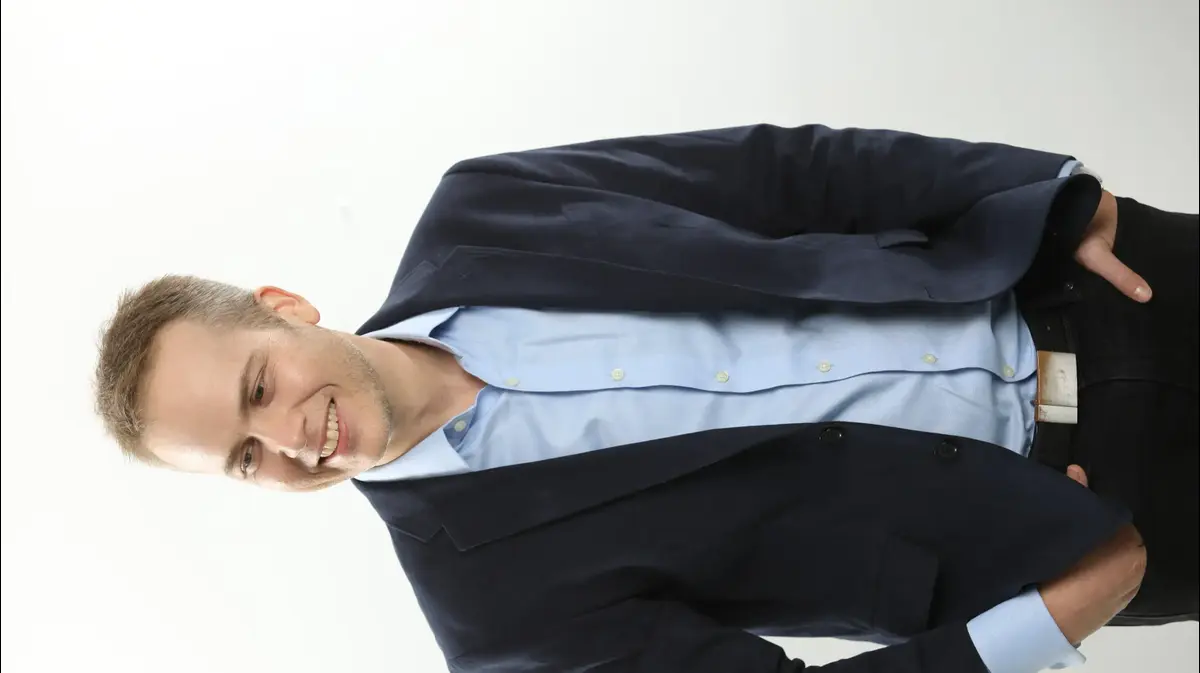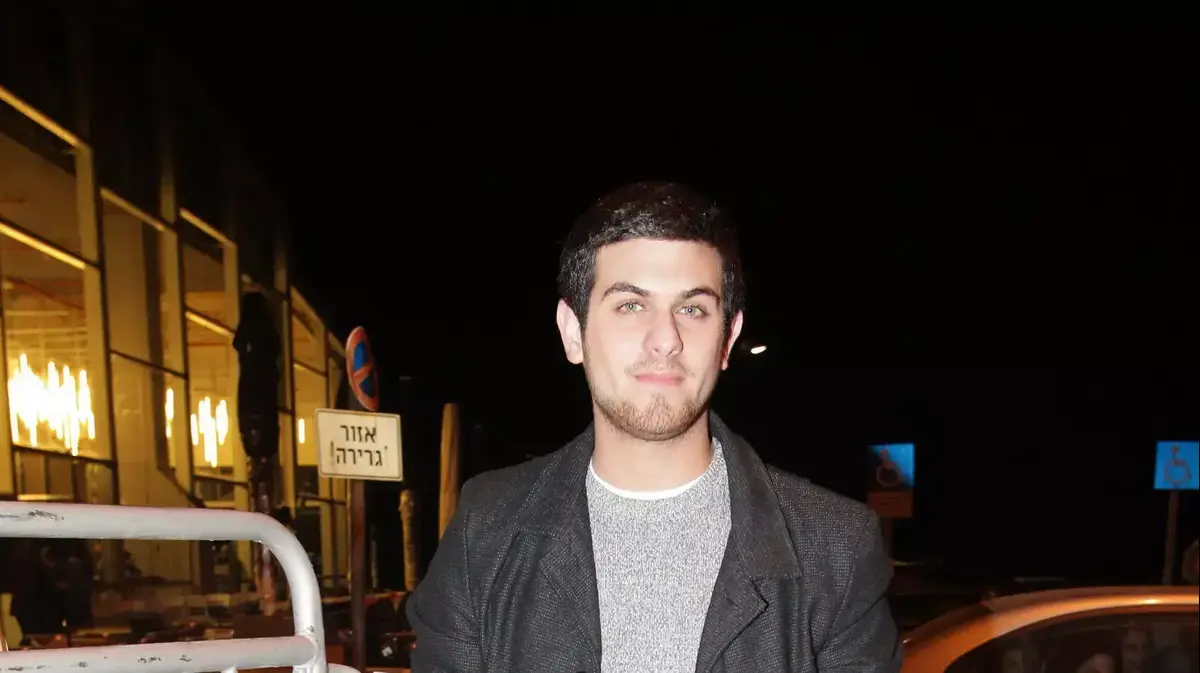Without blinking: curing neurological diseases through the eyes
Childhood in Jerusalem, the dream of becoming a writer, the academic, occupational and personal crisis - and the big breakthrough that followed.
Micah Brixton tells about the important stations in his life and dreams of curing the world of neurological diseases by deciphering the movement of the eyes
Liat Ron
09/15/2022
Thursday, September 15, 2022, 2:19 p.m. Updated: 2:23 p.m.
Share on Facebook
Share on WhatsApp
Share on Twitter
Share by email
Share in general
Comments
Comments
Micah Braxton, founder and CEO of Neurolight (Photo: Yonatan Blum)
Name: Micah Brixton, 44 years old, founder and CEO of Neurolite.
Who I am:
I was raised to live a life with meaning and leave behind a better world. I believe in hard work, my comfort zone is in action and change, judge people fairly and really enjoy helping others.
Roots
: Both parties were born in America, with roots in Russia. My maternal grandfather, a first generation immigrant, was a senior attorney at the Public Defender's Office in New York and defended underprivileged populations before the Supreme Court.
Grandma had three doctorates, at a time when it was not common for women.
She volunteered for the US Army after World War II. Mother was born in the US, earned a master's degree in education and immigrated to Israel at a young age, her father fell ill and died of Alzheimer's.
Father's parents were very Zionist.
Grandpa, who was a dentist, founded an association of American dentists for Israel and would come every summer for three months of volunteering at the kibbutz.
At some point they made a move and lived for half a year in Kibbutz Tsara and half a year in New York.
Grandma was the president of the Hadassah Association in the area where they lived and ran Grandpa's office, today she is 98 years old, a very special woman.
Father earned a doctorate in education, ran an American high school of the conservative movement, was the president of the conservative movement in Israel and the vice chairman of the agency under Boji Herzog. Mother was a counselor for new immigrants from the United States and later a private English teacher. They divorced and remarried, mother lives In Ra'anana and father in Jerusalem.
My childhood:
Jerusalem with all the slang of a cat and Ago'im, a typical Anglo-Saxon family.
We studied in an integrative school.
I have always had an American accent in English and an Israeli accent in English.
I was a polite child, who didn't know what elbows and bravado were, I wore a kippah until the 7th grade, I played chess and tennis, I was raised on tikkun olam and I dreamed of becoming a writer.
I studied at the traditional high school near Mahane Yehuda and expanded mathematics and physics.
writing:
I always felt like a foreigner and it allowed me to look at things from the outside and experience other people's stories through my subjective prism.
I wrote several novels and at the age of 22 I sent the first novel to book publishers.
They all rejected him, except Teresa Biron from Am Oved, who took me to lunch and told me, when you grow up you can be a writer, but there isn't much money in that.
After 20 years she came to my office and asked why I didn't want to work with her on my book.
Maybe it will happen one day. I sin in writing all the time: I wrote Ellie, my daughter, a book of rhymes for her birthday one year and every year I will add another one.
Education
: After military service as a paramedic and paramedic instructor at Behad 10, I was accepted into the outstanding program "Amirim Teva" at the Hebrew University and because I had a partner who studied cinema, I decided that someone would have to bring home money, I chose mathematics and computer science and worked in start-ups. At the end of my bachelor's degree I was working as a student programmer at Intel.
I also finished my master's degree in mathematics with honors and was debating whether to do a doctorate in mathematics and become an individual mathematician or change direction, so I took a break and flew to India and Nepal for a year to look for myself.
In the end, I signed up for a PhD in cognition, to capitalize on my abilities in language research.
There I met the late Prof. Idit Doron, who researched how the brain interprets language through mathematics - and I devoted myself to the field. There are mathematical functions that are responsible for objects in language and through which it is possible to predict interpretations, visibility of language and what its parameters are.
MIT:
My doctoral supervisor taught at MIT and he invited me there for two years on a full scholarship. Before that I had never lived in the US and I had never thought of moving there.
In the first year I wrote two articles and decided to participate in the university's startup competition.
We didn't manage to qualify for the final stages of the competition, but the entrepreneurial jock got into me.
My supervisor was less than thrilled that his student was starting companies instead of writing articles and he announced that my funding was cut off, all or nothing.
At my previous exit, he asked me if there was any way to donate to the school, because it is important to him to prove that those who study cognition can also succeed, and from next year there will be a seminar named after our Eli.
The funding for the PhD was stopped, but after he was successful, he was asked for a donation, MIT (Photo: official website, Felice Frankel, MIT)
Israel
: I returned to Israel with my tail between my legs.
My fiancee broke up with me because she thought it would be hard to build a family when I was busy building baseless companies, I lost my dream scholarship at MIT, and the companies didn't take off.
I started working at "Ginger Software", I advanced very quickly to the position of VP, and when I wanted to leave, the CEO allowed me to set up an independent business unit within the company, along with three people I gathered and accompany me to this day.
When our division was purchased by Intel , they offered me a lot of money to stay, but after three months I couldn't hold on, my heart broke. I got on a work flight with a stopover in New York, and I didn't get on the connecting flight, because I couldn't, and at that moment I left.
I lived with my grandmother in New York for a month and I felt like I made the mistake of my life when I gave up so much money.
I went to California, opened a company that failed, returned to Israel, opened another company and closed it, like that for seven months, no salary, no job, I just finished my doctorate, very stressful.
Corus AI:
I met a Canadian partner, who was the first employee of Eric Schmidt, the chairman of Google, and we founded "Corus", which was built on the idea we sold to "Intel", but greatly upgraded: a platform that allows you to record all the sales calls, transcribe them , analyze what is said in them and provides insights to the sales people and managers.
When we got to Silicon Valley, they started chasing us.
We took the best foundation in the field, within four months we already had a product.
The partner was in the US and I was in Israel. We had a company in hand that could have reached many billions, the "Gong" company, the competitor, is worth seven billion dollars today. My vision was to perfect it even more, so that during a conversation the system would alert, for example, "You are blinking A lot," "I didn't get to the heart of the matter," "You talk too much."
But after six years, when the purchase offer from "Zoom Info" came, we decided to sell it for 575 million dollars and I'm not sorry because it's an excellent sale, that people can only to dream about her. My life has changed from one end to the other. I have a peace of mind that allows me to do something for the soul.
good to know (in advance)
A revolution in the world of facial treatments: AI and radio waves in a home device at a special price
Served on behalf of B Cure Laser
It turns out that the way we blink says quite a bit about us (Photo: ShutterStock)
Veronica:
My partner, a smart and powerful woman.
She has a master's degree in law from Harvard, she worked as a lawyer in Germany and England, and she did her best.
She grew up in Soviet Russia, made her own way, has excellent educational values and is a wonderful mother to our one-year-old Ellie.
We met in Israel when I studied at MIT and we live in Texas.
Investments:
after the sale I made angel investments, I helped about a hundred start-ups and I am invested in 29. I established a network of leading entrepreneurs who help each other, a thriving group of personal connections, with purchases in it and joint events, which does a lot for the community.
Very quickly I felt I had to do something.
I started several ventures that were not successful until a year and a half ago I met Edi Ben Ami who wanted me to invest in him.
Within ten minutes of conversation I realized that I wanted to work with him, a love story from the first moment.
We are good friends and excellent partners.
Neurolite 1:
A platform that extracts biomarkers from microscopic eye movements, captured by a standard video camera or smartphone, and knows how to diagnose multiple sclerosis, ALS, Alzheimer's and Parkinson's.
Neurology today is more of an art than a science, because the diagnosis of these diseases is carried out through a lot of questions, with the help of which the diagnosis and treatment are determined, as each disease has its own questionnaires.
In the studies conducted it was found that there are 30% wrong diagnoses in Parkinson's, while in other diseases the situation is slightly better.
Since this is only an assessment, few drugs are developed for these diseases, because it will not be possible to measure their effect on the patient and whether they improve his condition.
Already in the 60's of the last century, a connection was found between the state of cognitive processing of the brain, and microscopic movements of the eye, such as the act of calculating or trying to remember something.
Our strength lies in early diagnosis of the disease and the ability to accurately determine the stage in which it is, which is not subject to the discretion of the diagnosing doctor.
Neurolite 2:
We are in the midst of a commercial deal with "NeuroSense", an Israeli company traded on Nasdaq, and we have raised $30.5 million. We have passed the Helsinki Committee, which gives permission to try the system on patients in Ichilov and Rabin Hospital, and we are in the second trial. It will be between five and seven years until the system is accessible to all patients, because the medical world is very conservative. We work with the best neurologists, two of whom are Nobel Prize winners.
Leisure:
A lot of Eli, my baby, who was born the day we signed the first recruitment of Neurolite, my second baby now. I take Breaks during the day to be with her in our garden, with the swing and the pool. Once a week I have a swimming lesson and I play chess with an international master.
Looking ahead:
I am building Neurolite so that it becomes a huge public company, that will not only be worth billions, but one that will change the world.
There are over a billion neurological patients worldwide, like my two grandfathers who died with dementia, who yearn for the best care and we will help give it to them.
Of money
All the articles
Tags
eyes
Neurology
mit


/cloudfront-eu-central-1.images.arcpublishing.com/prisa/K6S6W4EXJ5BQTOJZKVLQCIZDQY.jpg)






